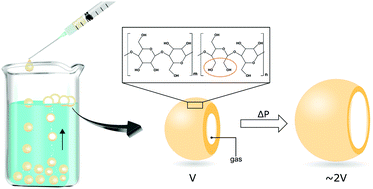Wet-expandable capsules made from partially modified cellulose†
Abstract
Preparation of lightweight and biocompatible hollow capsules holds great promise for various advanced engineering applications. Here, we use a heterogeneously modified structure of cellulose, which on the molecular level increases the flexibility of the capsule shell, to form hollow capsules. These capsules expand in the wet state when they are exposed to an external stimulus, in the present case a decreased external pressure. The capsules were prepared by a dropwise precipitation of a propane-saturated solution of cellulose partially modified to dialcohol cellulose, dissolved in a mixture of N,N-dimethylacetamide and lithium chloride, into a non-solvent. The mechanical properties of the capsules were determined by measuring the expansion of the capsules upon a controlled decrease in external pressure. In addition, indentation measurements using atomic force microscopy were used to independently quantify the moduli of the capsule walls. The results show that the wet, modified cellulose capsules are much softer and, upon the same pressure change, expand significantly more than those made from unmodified cellulose. The greatest expansion observed for the modified capsules was 1.9 times the original volume, which corresponds to a final density of the expanded capsules of about 14 kg m−3. These capsules therefore hold great potential to form green and lightweight foam-like materials.



 Please wait while we load your content...
Please wait while we load your content...